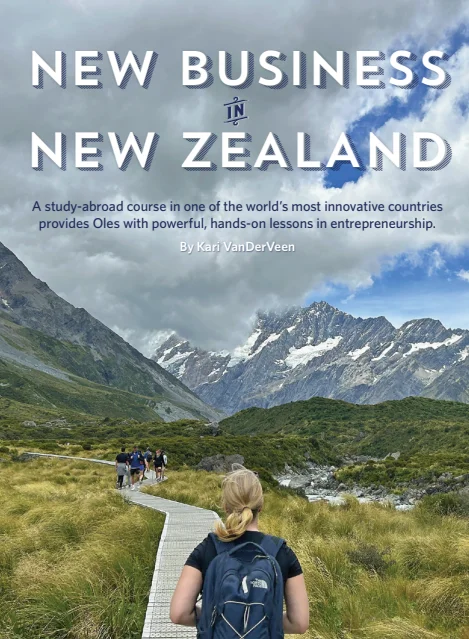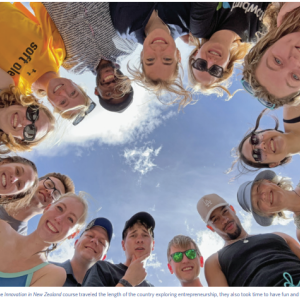AT A BUSINESS INCUBATOR IN CHRISTCHURCH, New Zealand, this January, a class of St. Olaf College students eagerly participated in a design thinking exercise on the circular economy. As they exchanged ideas back and forth on how to create a resilient economic system that is good for business, people, and the environment, they were led in discussion by a team of entrepreneurial experts that has supported the launch of 214 startups and raised more than $112 million in capital. Then the 23 St. Olaf students were given 30 minutes to create a business plan and pitch the idea to the group. It was a powerful lesson in quickly developing, honing, and pitching entrepreneurial ideas, says Caleb Kaestner ’24. And it was an experience that he enjoyed so much that he continued to evolve the idea he came up with in that moment, eventually pitching it at this year’s Ole Cup student entrepreneurial competition on campus. He won first place and $10,000 for his pitch of Sunsor, a proactive plant care system that uses data to simplify plant health and reduce waste. “This was absolutely the best class for educating me in great depth on how to start a business,” Kaestner says, noting that the hands-on learning experiences he had in New Zealand have helped him pave a clear path for the future. “I get to apply almost everything I have learned as part of a process that is taking me from idea creation to potentially building a company after college.” That’s exactly what St. Olaf Entrepreneur in Residence and Director of Business and Management Studies Sian Christie hopes students take away from her Innovation in New Zealand course. “Entrepreneurship is best taught through opportunities to practice and learn from others,” she says. “Students often struggle with ambiguity and worry about not having the ‘right’ answer. In this course I try to stretch our students to get out of their comfort zones in a completely different and unique environment.” New Zealand is one of the most innovative countries in the world. According to the most recent Global Entrepreneurship Monitor report that included New Zealand, 18 percent of the adult population counted as entrepreneurs. Students in Christie’s course study the ecosystems that support growth and entrepreneurship, and consider the key aspects that foster innovation. “LIVING WITH AND TRAVELING WITH A GROUP OF AWESOME OLES GIVES ME AN OPPORTUNITY TO SEE MY HOME COUNTRY THROUGH THEIR EYES AND THINK OF NEW WAYS TO SUPPORT THEIR EDUCATION AND GROWTH. THE GEOGRAPHY IS SO DIVERSE IN SUCH A SMALL COUNTRY, SO WE HAVE THE OPPORTUNITY TO EXPLORE MOUNTAINS AND OCEAN WHILE LEARNING ABOUT THE CULTURE AND NATURAL RESOURCES.” — SIAN CHRISTIE, St. Olaf Entrepreneur in Residence


“The goal is that the students will consider ways in which they can bring this innovative way of thinking back to the U.S. or wherever home is for them,” Christie says. Tyler Rice ’17 did exactly that. A political science major at St. Olaf with concentrations in management and Nordic studies, he took the Innovation in New Zealand course his senior year. After graduation he worked as a consultant for UnitedHealthcare and then participated in Stanford University’s Idea-to-Market Incubator, where for the next six months he created a business case for digital wellness at both workplaces and schools. He went on to co-found the Digital Wellness Institute and earn his master’s degree at New York University’s Wagner School of Public Service. Of all of those experiences, he says the St. Olaf course he took with Christie stands out. “Going to New Zealand and studying innovation there, I learned as much in that class as I did in the Stanford incubator and even some of my graduate-level courses at NYU,” Rice says. “It really prepared me to be an entrepreneur.” Students in the Innovation in New Zealand January term course spend the month traveling the length of the country, from Dunedin to Auckland. This year they visited three business incubators and heard from eight guest speakers with a wide range of expertise. Andy Blackburn is a digital and innovation manager who ran the design thinking exercise the class participated in at the Ministry of Awesome in Christchurch, an incubator for highgrowth startups and innovators. This is the third year he’s worked with the Innovation in New Zealand course, and he says he’s enjoyed seeing St. Olaf students define and understand a diverse set of problems and then work to create exciting, novel, and relevant solutions. “I have been impressed with the students’ abilities and also their keenness to get involved and learn innovation by giving it energy and commitment,” he says. “The resulting pitches were lots of fun, and some real opportunities were created.” As they traveled the country, the class visited sites that provided an opportunity to explore and discuss many of the key economic drivers of the country, from tourism and the film industry to farming and technology. Students also learned how the Māori culture and traditions are an important and significant part of the overall culture of the country. They heard from indigenous entrepreneurs and visited important cultural sites and regions — Kaikoura and Rotorua, in particular, have iwi (tribal nation)–run businesses that explain and celebrate the Māori traditions, Christie notes. The course concluded with a “hackathon” where students had 24 hours to compete in teams to come up with a new venture. Jean-Luc Collette ’25, Anna Grace ’26, and Joshua Sansom ’25 brought the idea they developed back to campus and pitched it during this year’s Ole Cup
The experience in New Zealand was a perfect fit for Fiona Bošković ’25, a computer science major with a business and management studies concentration. She has spent three summers as a technical program manager intern at Microsoft for AzureML in the Cloud and AI Division, and she will continue her work in the company’s AI services after graduation. “I recently pivoted from working as a software engineer to technical program management. Throughout our class in New Zealand we learned a lot about innovation, including creating our own product ideas and pitching them to others, and I really enjoyed the overall process of this work — which helped confirm that I made the right decision in my career shift,” Bošković says. Jules Fromm ’25, a biology and environmental studies major, says the class pushed her to use a different set of skills and way of thinking. “I learned a lot of networking and communication skills, and was able to sharpen my ability to simplify complex ideas,” she says. Although she’s not sure she’ll ever become an entrepreneur, she knows the course’s key takeaways can apply to a wide range of fields — including the career she plans to pursue in science. “My experience with this class was amazing,” she says.




